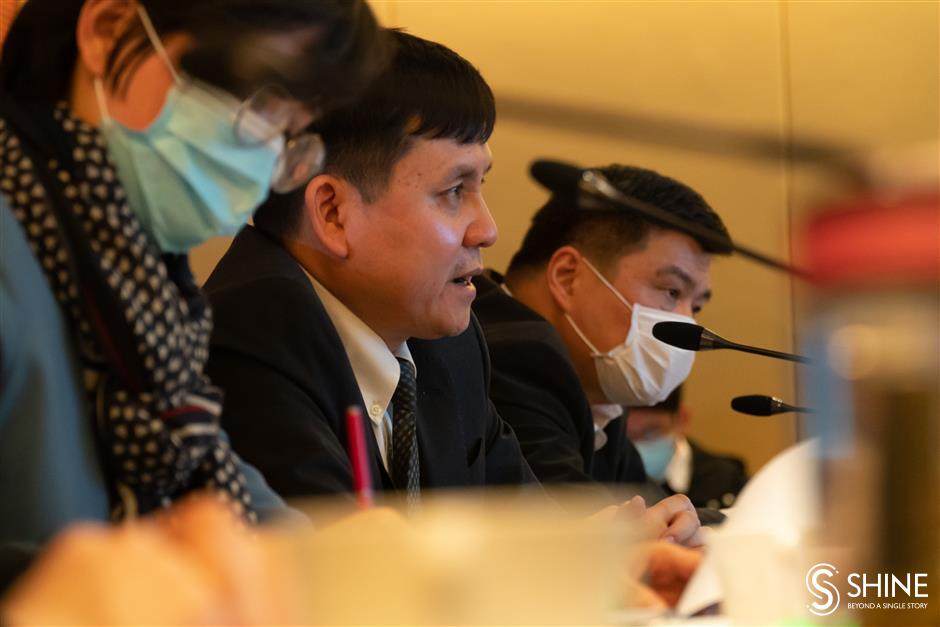Meticulous measures should be taken as early as possible to prepare for a long battle against COVID-19,a city expert said during a video dialogue with Bangladesh on Wednesday.
DrZhangWenhong said the overall mortality rate of COVID-19 may fall between 2 to 3 percent, while the pandemic is not likely to end in a short time. He stressed that there was no cure-it-all solution for every country.
Zhang, director of the Department of Infectious Disease atHuashanHospital affiliated toFudanUniversity and head of the Shanghai COVID-19 treatment team, had been invited by the Shanghai Health Commission to share his expertise with Bangladesh.
So far, Bangladesh has reported 164 confirmed cases and 17 deaths. The government has undertaken strong curbing measures including an extension of its nationwidelockdown, which began on March 26,to April 14.
Though the reported number is moderate,Zhangthinks Bangladesh has already missed the early opportunity to curb the virus since community transmission has occurred in rural areas according to local medical authorities.
For countries at an early stage of transmission, preliminary and thorough screening of suspected cases and epidemiological investigation of close contacts are very effective, he said, which were adopted by cities such as Shanghai.
“However, in my opinion, massive testing is not recommended for Bangladesh due to the shortage of testing kits. They should be reserved for severe cases first, or transmission in hospitals and collapse of medical systems may happen. Fever clinics can also help to screen patients at an early stage,” he said.
He emphasized the importance of social distancing.
“Shanghai has effectively contained the spread of the virus largely due to the support from the public since the Spring Festival. That is to stayat home and wear masks,” he said.
But he also said methods such as wearing masks should depend on the situation in each country. Overall, early measures are crucial to effectively contain the spread of the virus, he said.
The government and civil societies in Bangladesh have donated various kinds of medical and health supplies to China. Many prayers were also held for China by Bangladeshi religious communities.
China has donated medical equipment including testing kits to Bangladesh in return and a 50-strong medical team will be sent to Bangladesh to support its fight against COVID-19.
“The people of Bangladesh have stood firmly by the Chinese people in our battle against the epidemic. As a grateful nation and a close friend of Bangladesh, China would like to reciprocate and help as much as we can,” said LiJiming, China’s ambassador to Bangladesh.
“We would like to express our gratitude for the medical support from China, as well as this opportunity provided by the Shanghai Foreign Affairs Office and Shanghai Health Commission. It’s crucial for us to learn from China in terms of the most effective ways and attempts to contain the virus,” said ZahidMaleque, theBangladeshi health minister.
“Shanghai has accumulated experience in preventing and treating the coronavirus and proved our methods effective and applicable for such a mega city. We would like to share our solutions to contribute to global health and safety,” saidBeiZhaojian, deputy director of the Shanghai Foreign Affairs Office.

Zhang Wenhong, head of the Shanghai COVID-19 treatment team, shares his expertise with Bangladesh via a video dialogue on Wednesday.
Q: What is the false negative rate of nucleic acid tests?Is it feasible to implement quick molecular tests and antibody tests?
A: The most popular testing method in China is real-time PCR testing because of its high sensitivity, which takes about two hours. Compared with PCR testing, some rapid testing giving results in 15 to 30 minutes is less sensible. As to antibody testing, it’s only effective to identify cases infected after a week.
The false negative rate is about 10 percent after testing twice. CT scans and accompanied quarantine measures are typical to minimize the rate.
Q: How should we handle infected patients and isolate them?
A: Home quarantine for the infected is hard to monitor, so we recommend cabin hospitals transferred from vast public facilities to treat massive mild cases. We can share design drawings including the details of safety passages for these hospitals. But it should all depend on the number of cases and local home conditions, and I hope Bangladesh won’t worsen to this stage.
Q: It is said that the reproduction number (R0) of the coronavirus is between two and three. What do you think about the transmission speed of coronavirus since it’s quicker than infectious disease like measles and SARS?
A: Experts have basically come to consensus that COVID-19 is far more contagious than SARS, likely with a R0 between three to four. Personally I think it’s close to four. We cannot copy the strategy of coping with SARS. Among the patients, 36-38 percent of them are transmitted through latent asymptomatic cases. Longer incubation periods and asymptomatic contagion are the main reasons for its rapid spread.
